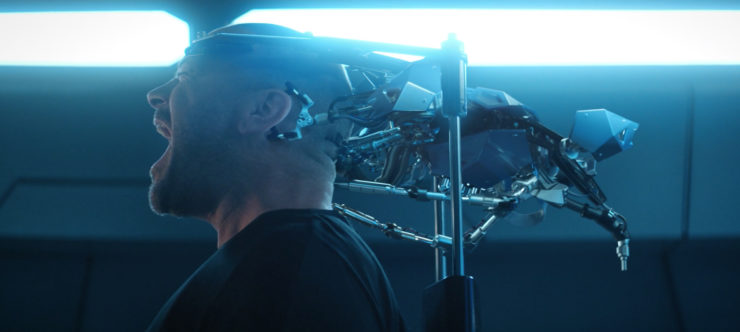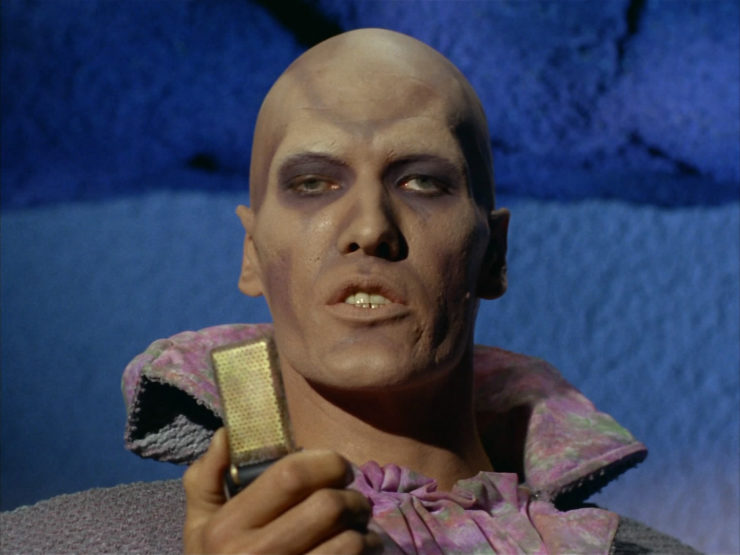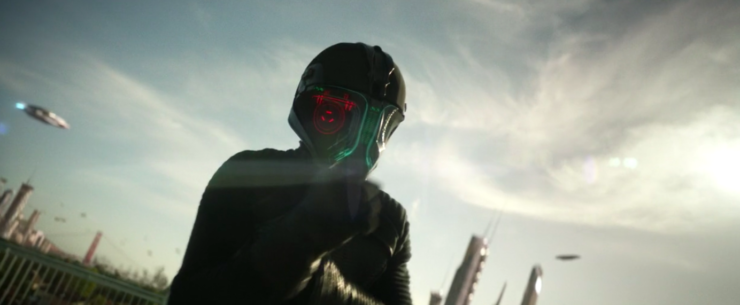Spoilers ahead for Star Trek: Picard, season 1, episode 2, “Maps and Legends.”
Turns out, the Romulans–or a significant secret society of them–have a serious bone to pick with “all forms of synthetic life.” The latest wrinkle in Star Trek: Picard has added a new detail to the origin story of the Romulan’s Tal Shiar spy network in the form of a new cabal called “the Zhat Vash.” We know only two things so far: They’re thousands of years old and they really don’t seem to like synthetics or artificial intelligence.
But why are they active now? What is it about near-human synthetic life that they hate and fear? And if we pull on this thread far enough…do we encounter Control, the big bad artificial intelligence from the latest season of Star Trek: Discovery?
Are these two shows more connected than we thought?
At the start of “Maps and Legends,” Picard’s loyal Romulan companions, Laris and Zhaban, give him the skinny on a scary Romulan rumor: The idea that the Tal Shiar was a “mask” for a group called the Zhat Vash. Laris describes them as a “far older cabal” than the Tal Shiar, and they are founded on secret war against androids. The question is, how much older? Picard happens in the year 2399, and in The Next Generation, the first mention of the Tal Shiar happened in the episode “Face of the Enemy” in 2369. Obviously, the Tal Shiar is older than that, though, but it’s not clear if their origin predates the 24th-century era of Star Trek or not.
To put it another way, what we tend to forget about Trek is that there are sometimes more than a century in-between the different series. Meaning, the myths of one era could have been something relatively commonplace say…142 years before. In other words, the Zhat Vash Romulans in the late 24th century could have started to hate A.I. way back in the 2250s, during the era of Discovery and The Original Series.
Star Trek: Discovery season 2 is set in 2257, during a time when Starfleet doesn’t even know what the Romulans look like. (That didn’t happen until “Balance of Terror” in 2266.) This means, there’s no mention of the Romulans or Tal Shiar in Discovery, at all. Of course, this doesn’t mean the Tal Shiar or the Zhat Vash doesn’t exist in 2257, it simply means that people in the Federation would have no clue about it. The Federation would also have zero idea of what kind of tech the Romulans were playing around with because as Spock points out in “Balance of Terror,” humans haven’t even seen a Romulan ship since the 22nd century.
So, we’ve established there are some pretty big gaps in what we humans know about the Tal Shiar. Here’s the only thing we know for sure. The Tal Shiar existed at some point before 2369, because in “Face of the Enemy,” a Romulan named Toreth says her father was “dragged” out of their house by the Tal Shiar. If this happened when Toreth was a kid, then it’s reasonable that the inception of the Tal Shiar could have still happened in the early days of the 24th century. This means…the Zhat Vash could have been the proto-Tal Shair — the “far older cabal” – doing Romulan dirty work in the 23rd century, and perhaps, earlier.
If we grant the premise that the Zhat Vash is operating in the Discovery era of Star Trek, around the 2250s, then perhaps they developed their own version of an A.I. similar to Section 31’s rogue super-computer, Control. In “Maps and Legends,” Laris says the Zhat Vash has kept their secret of hating A.I. for “thousands of years.” She also says they have operated outside of treaties, which means, its possible members of the Zhat Vash could have been easily posing as Vulcans in Starfleet during Discovery. So, what if Admiral Patar in Discovery was a Romulan Zhat Vash member and also not a Vulcan? (This would be an interesting link, considering a fake-Vulcan who is really a Romulan also was central to the plot of “Data’s Day” and TNG episode framed as a letter to Bruce Maddox, who is suddenly a super-big deal on Picard!)
The larger point is this: There could be Zhat Vash hunting down all sorts of artificial intelligence throughout Star Trek history. Laris says that the Zhat Vash are Romulans with “hate and fear and pure loathing for any form of synthetic life.” Laris doesn’t know why the Zhat Vash poses this hatred and surely, Picard will reveal just exactly how all of this came about. But, if it’s so embedded into this Romulan sub-culture, then it stands to reason the Zhat Vash have been fighting A.I. or at least aware of it, in other eras of Star Trek.
The rogue A.I. called “Control” was created by Section 31, which is basically the equivalent of the Tal Shiar within the Federation, and in very short order it comes close to taking over Starfleet and crippling the Federation.

If the Zhat Vash hate A.I., perhaps that’s because something similar happened to ancient Romulans–a complete A.I. takeover, and possible Skynet-level massacre. It that was true, it would stand to reason that the Zhat Vash would want to weaponize what they hated, and use it against the Federation.
We know living computers and advanced androids go way back in Star Trek history. The android Ruk, in “What Are Little Girls Made Of,” was built by a culture 50,000 years old. Could the Zhat Vash have had a hand in this, too? Or, more to the point, could the mysterious “Old Ones,” who built Ruk have, at some point in the distant past done something terrible to the Romulans? We know that the Romulans left the planet Vulcan around what would have been the 4th century on Earth, so there’s certainly a couple millennia of range for some kind of weird android invasion to have happened in Romulan space.

It’s also worth noting that in Discovery season 2, Control has access to time travel, meaning that Control could specifically be the A.I. responsible for creating the synthetic life and A.I. that promoted the Romulans to create the Zhat Vash.
Picard takes place 142 years after the last season of Discovery, but both shows deal with troubles with A.I. and A.I. revolts. It could be a coincidence. It could be an accident. Or, it could all be the product of a time-traveling artificial intelligence, that will somehow unify the Star Trek timeline in ways we never saw coming.
Ryan Britt is a longtime contributor to Tor.com and the author of the book Luke Skywalker Can’t Read and Other Geeky Truths (Plume 2015.) His other writing and criticism have been published in Inverse, SyFy Wire, Vulture, Den of Geek!, the New York Times, and StarTrek.com. He is an editor at Fatherly. Ryan lives with his wife and daughter in Portland, Maine.










